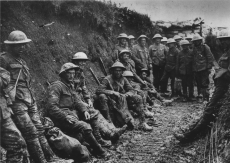
Wilfred Owen (1893-1918) has arguably become the most well-known English poet of the First World War, his poetry famous for its often polemical style and its brutal illustration of the needless suffering of that war. And there is no greater example of his raging against the mass slaughter of Europe’s young men than in his poem Dulce et Decorum est.
It is worth noting, however, that before he went to France and witnessed the horrors of the First World War for himself, a conflict which claimed around 17 million lives, he was very much for the idea of Britain entering the war. At the time in Europe there was a prevailing sense that much of Europe’s latest generation of young men were weak and feeble minded and that a war might be an opportunity to get rid of these degenerates, while sparing the strongest and most intelligent of them. Owen wrote a letter to his mother in 1914 saying that ‘the guns will effect a little useful weeding’.
However, when he joined the conflict in 1916, he came to realise that the war was nothing like as he had imagined. During his time at the front he was nearly hit by a mortar strike, causing him to suffer afterwards from shell shock which he was sent home to recover from. It was at this time that he wrote Dulce et Decorum est, a twenty-eight line poem which argued that the idea that it was “sweet and honourable” to die for young men to die for their country was a lie.
He starts out by describing the soldiers walking across the war-torn landscape: “Bent double, like old beggars under sacks/ Knock-kneed, coughing like hags, we cursed through the sludge […] Men marched asleep”. He depicts the young men as if they are sick nomads, crippled by the harshness of battle, made old and weary before their time. In their exhaustion, for a second they barely notice the “gas shells dropping softly” just behind them at the end of the second stanza.
At the start of in the next stanza, they awake from their walking sleep, “Gas! GAS! Quick, boys!” The First World War was a war of many firsts; one of the most awful of these being that it was the first time gas was used extensively on the battlefield, often to lethal effect. The only way one could protect oneself from it was to put a gas mask on – which is exactly what Owen shows the soldiers doing, “Fitting the clumsy helmets just in time”. There is a sense of fear and urgency in these lines, the capitalisation of “GAS!” revealing the overwhelming panic of these soldiers, their “ecstasy” and their “fumbling” for their masks putting them in complete contrast to how they were just seconds before.
Unfortunately, we discover in the same stanza that one of the soldiers has failed to put his mask on in time. Owen observes, “As under a green sea, I saw him drowning/ In all my dreams before my helpless side/ He plunges at me, guttering, choking, drowning.” The first and last of these lines emphasises the unbelievable horror of watching someone die from gas attack, the unsettling imagery suggesting that the man is suffocating, the gas corroding his lungs and causing him to drown from the inside. The second line of this quote emphasises the traumatic effect the event has had on the soldier who witnessed it; the man’s last moments remaining firmly in his mind.
It is on this note that Owen turns to his readers and asks that if they had seen such suffering, they “would not tell with such high zest/ To children ardent for some desperate glory,/ The old Lie: Dulce et decorum est/ Pro patria mori.” The Latin phrase which ends the poems translates as “it is sweet and honourable to die for one’s country” and it is by so deftly contrasting this popular ideal of the time with the harsh reality of war which makes Wilfred Owen’s Dulce et decorum est one of the greatest of war poems.
Image: By Royal Engineers No 1 Printing Company. [Public domain], via Wikimedia Commons

0 Comment:
Be the first one to comment on this article.